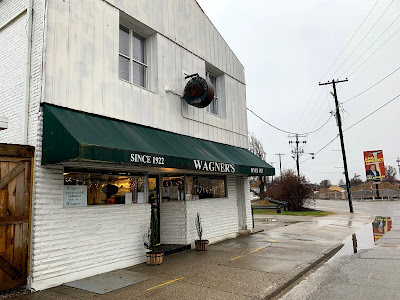Calamity. There was no other word for it. Because hurtling down Interstate 65 north, in that great middle distance between Nashville and Louisville, with my wife next to me in our Subaru, the car hydroplaning at eight-three miles-per-hour, and headed headlong through a Kentucky cloudburst of biblical proportions, that was calamity. It was to find ourselves balls-deep, so to speak, in a rising waterscape of likely disaster with nary a raft of hope which to cling. So I gripped the wheel of our car, leaned forward, and squinted out the windshield. My wife cowered in her seat and covered her eyes. I might as well have done the same because I couldn’t see a thing. Nothing. Nada. Zero. Zilch. I drove on, utterly blind to what might lay before us in the road. Day had turned to night. The sea had been called from the sky. And the highway on which we traveled was suddenly submerged under a sluice of never-ending water. Cars spun off the road. Ditches filled. And waterfalls boomed around us where only moments before cliffs of dry, blue limestone had simply just loomed. It was the kind of water-and-lightening show that turns the irreligious suddenly devout, and which calls into one’s own mouth prayers learned in childhood, which beg to petition God—one god, any god—for escape from certain doom. The only thing to do was keep on driving. And try not to die.
We lived. Obviously.
Because the storm ended as quickly as it came. The rain stopped. The low ceiling of clouds lifted. And a tiny sliver of blue sky appeared on the horizon as if to suggest that one need only reach that far edge of the world to never again be harried by clouds and rain. So we soldiered on, my wife and I, with the adrenalin in our veins suddenly thickening to maple syrup, and both of us feeling now sluggish and scraped out and in desperate need of a break. We prayed for something else now; we prayed for something to eat—something truly delicious—and decided to pull off the highway the second we smelled food on the Southern wind.
It turns out there is a god, after all. At least a god of gastronomy. Because what we found the minute we breached the city limits of Louisville was an answer to our culinary prayers: Wagner’s Pharmacy and Restaurant.
Wagner’s stands at the very epicenter of Kentucky horse country. Established in 1922 by Leo Wagner from the bones of the erstwhile Hagen’s Pharmacy (where Leo had worked since the age of 14), the eponymous Wagner’s sits, then as now, directly across the very street from the back gate of Churchill Downs. The site of the Kentucky Derby, yo. But more than just a sentimental relic of nostalgic curiosity, the still-vital Wagner’s remains that rarest and quickly-vanishing kind of American luncheonette; a time capsule of our collective, culinary past, and just the kind of place you or me might purchase race horse liniment, a tube of Tiger Balm, and a pack of Winston lights to go with our racing form and our patty melt lunch.
We arrived two hours after lunch and precisely at the moment the restaurant was closing for the day. The dining room and lunch counter were empty of customers, and the grill cook was all but finished in restoring the flattop to a state of gleaming immaculacy with the business end of a putty knife when we wandered in. Conversation among the staff—two servers, a dishwasher, and our cook—stopped. They blinked up at us, though not unkindly, as if to divine the stuttering confusion of two lost travelers in need of directions back to the main road. But with one quick read of our faces, they understood we had come for something more than just food. We had come for comfort. For shelter and solace. For a respite from the wearying road. So we were seated in a booth and offered plastic-covered menus and told not to worry about the lateness of our arrival; they would be more than happy to feed us.
And feed us they did.
For me, it was a simple fried bologna sandwich on rye with chips and a pickle. My wife went with vegetable soup and a grilled cheese. A Doctor Pepper in a tall plastic cup—two straws—would wash it all down. And while most certainly quotidian in its workaday ambitions, I found my fried bologna sandwich at Wagner’s to be one of my greatest sandwiches of my life. Not because there was anything inherently magical about the food beyond that deeply familiar Southern savor resultant from the coupling of utility lunch meat and a flat top grill (though there be great magic in that culinary tango, friend-o), but because our food was exactly what we needed when we most needed it, with the service itself—the way we were received and continually cared for throughout our quick meal—being deeply paradigmatic of Southern hospitality in its purest form. We felt cared for. We felt nourished. We felt protected. And after the storm we had just weathered, the food before us, and the warmth emanating from the humans making and serving it, was nothing short of astonishing. It was true culinary love.
Thank you, Wagner’s, for treating us so very well. There are certain meals in our lives—few as they are—that color and contour the very shape of what—and how—we see the waking world around us. Experiences like ours at Wagner’s affirm for the eater—my wife and me especially—that inside chest of every server and cook, there beats the heart of a savior and saint.
Especially in Kentucky.
Amazing what a guy can glean of life from a stop in Louisville and a fried bologna sandwich.
Go to Wagner’s. Eat. And give them my love.
Your link: Wagner's




